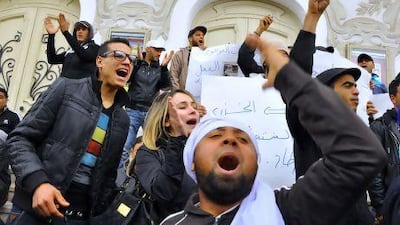TUNIS // Tunisian MPs approved a new government yesterday that the dominant Islamist party hopes will quell tensions over the killing of an opposition leader.
The easy approval was overshadowed by the death of a young street vendor who set himself on fire in apparent desperation over his failure to find a steady job, an act that reminded Tunisians that many of the economic disparities that led to the removal of their longtime dictator two years ago remain unresolved.
The new prime minister pledged immediately to reduce violence and boost the economy - and expressed his sadness at the death.
"I hope that we all understood the message" about poverty and unemployment in the young man's action, the prime minister, Ali Larayedh, said after the confidence vote.
Tunisia has faced instability since the overthrow of its former authoritarian president, Zine El Abidine Ben Ali, in 2011 in an uprising that prompted revolts around the Arab world. The Tunisian revolt began with protests in support of a street vendor who had set himself on fire to protest corruption, repression and unemployment.
Ennahda, an Islamist party, dominated Tunisia's first free elections, but has come under criticism for not cracking down on violence by militants and for failing to revive the economy.
Mr Larayedh's predecessor resigned after last month's killing of a vocal critic of Ennahda, a startling attack that set off riots around the country and plunged it into political crisis.
In a concession to the opposition, Mr Larayedh named a new government that includes several respected figures not aligned with any party.
In yesterday's vote in the constituent assembly, 139 legislators voted in favour of the new government, 45 against and 13 abstained. Ennahda has the most seats in the assembly.
Mr Larayedh pledged to speed up work towards elections and a new constitution for Tunisia. The assembly president, Mustapha Ben Jaafar, proposed setting the elections for October 27.
The new prime minister promised to improve security and "combat violence wherever it comes from and whatever colour it is".
The overarching challenge for Tunisia's new government will be improving the economy. Unemployment is 17 per cent - and higher among young people - and inflation at 6 per cent.
Joblessness appeared to be a driving factor behind the move by the street vendor, Adel Khedri, to set himself on fire on the main thoroughfare of the Tunisian capital on Tuesday.
Khedri, a 27-year-old whose family moved from a poor town in northwestern Tunisia to the capital in search of better economic prospects, had been struggling to find a steady job to help support his mother and five siblings, one of his brothers said.
Khedri died of severe full-body burns yesterday morning, said the director of the Tunis region's burn centre, Imed Touibi.
The United States noted improved security in Tunisia and said yesterday that it is boosting staff at the US Embassy in Tunis after ordering most non-essential employees to leave last year. Still, it said US government personnel have limited ability to reach travellers or provide emergency services throughout the country "because of the unpredictability of the security situation".

